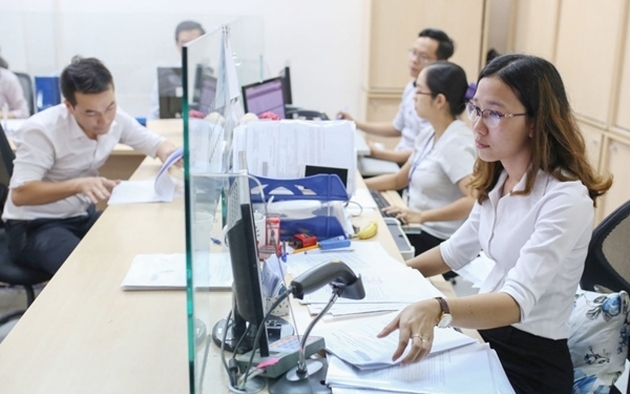
MHA has just issued the Code of Conduct for cadres, civil servants, public employees and workers of the Ministry.
MHA requires polite dress. Employees must have neat hair, and wear shoes or sandals with back straps. Their clothes need to be discreet, with skirts reaching above the knees. They must not wear skirts with overly high splits and T-shirts without collars.
Civil servants must not do private work during working hours, must not wear headphones, turn on music, listen to music, play games or use personal entertainment devices. They must not smoke at the office, or use alcoholic drinks before and during working hours or lunchtime. They must not burn incense, or store depraved images and cultural products, and documents against the Party and the State.
MHA has listed other things which must not be done.
Civil servants must not fall into social evils in any form; take advantage of positions and powers of individuals or organizations, in the name of agencies or organizations to do work for personal benefits; or appropriate people's money or property which may affect the reputation of the ministry, agencies, organizations and individuals.
Civil servants must not have a bureaucratic, authoritarian, bossy, or harassing attitude or behavior towards people, and must not intimidate people.
They must not suggest that people give money or gifts to them, or settle works outside agencies and in non-working hours to seek personal gain. They must not be indifferent, insensitive or irresponsible to the difficulties and obstacles of organizations and citizens.
They must not lose or let documents get damaged, or falsify records; they must adhere to the discipline of speech, not use social networks to disseminate unverified information which may affect public operations.
They must not disclose State secrets, or the names of the person lodging complaints or denunciation in accordance with the law.
For leaders and managerial officers, MHA says they must enhance responsibility and set good examples for officers; not take advantage of their working positions to appoint acquaintances; and take the initiative in resigning from their positions when they realize that they have limited capacity and low prestige.
Leaders and managers are required to protect the honor of cadres, civil servants, public employees and employees when there are untrue denunciations against them.
For civil servants and public employees who do not hold leadership and management positions, they are required to comply with the administrative hierarchy, obey the directions and assignments from their superiors; and not be choosy about working positions and tasks.
Civil servants and public employees must not take advantage of the right to express opinions and offer suggestions to criticize leaders, thereby affecting the prestige of leaders, managerial officers and co-workers; must not flatter superiors; and should not show off when organizing birthday or housewarming parties.
The Code of Conduct also stipulates what civil servants have to do:
- Loyal to the State of the Socialist Republic of Vietnam
- Protecting the honor of the Fatherland and national interests; respecting and devotedly serving the people.
- When performing their duties, civil servants have to be very aware of their responsibilities and obligations, ready to accept and make every effort to complete all the tasks assigned to them well.
- Respecting, listening to people, and wholeheartedly guiding the procedures that need to be followed, explaining thoroughly the questions raised by organizations and citizens.
- Saying ‘four xins’ (xin chao – good morning; xin loi – sorry; xin cam on – thank you; and xin phep – if you please), and doing ‘four luona’ (luon mim cuoi – always smiling; luon nhe nhang – always being gentle; luon lang nghe – always listening; and luon giup do – always ready to help).
Thu Hang

Teachers faced strict requirements on certificates in last three months
In February, the Ministry of Education and Training (MOET) released several circulars on teacher appointments and rankings, and necessary certificates.

State officers relieved as ministry reduces 'unnecessary certification'
Minister of Home Affairs Pham Thi Thanh Tra said the number of required certificates will be reduced to ease the burden on civil servants and public employees.